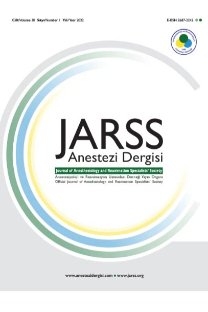Göz cerrahisi sonrası beklenmeyen postoperatif deliryum
Unexpected postoperative delirium following eye surgery: (Case report)
___
- 1. Diagnostic and Statistical Manual of Mental Disorders, 4th Ed. Washington, DC: American Psychiatric Association, 1994.
- 2. Inouye SK, van Dyck CH, Alessi CA, et al. Clarifying confusion: The confusion assessment method. A new method for detection of delirium. Ann Intern Med 1990; 113: 941-48.
- 3. Dasgupta M and Dumbrell AC. Preoperative risk assessment for delirium after noncardiac surgery: A systematic review. J Am Geriatr Soc 2006; 54: 1578-89.
- 4. Smita S. Parikh and Frances Chung. Postoperative delirium in the elderly. Anesth Analg 1995; 80: 1223-32.
- 5. Mohri-Ikuzawa Y, Inada H, Takahashi N, et al. Delirium during intravenous sedation with midazolam alone and with propofol in dental treatment. Anesth Prog. 2006; 53: 95-7.
- 6. Diagnostic and Statistical Manual - Text Revision (DSM-IV-TR™, 2000). First MB (Ed.). STAT! Ref Online Electronic Medical Library. 2000. American Psychiatric Association; 2004: 9–17.
- 7. Linn L, Kahn RL, Coles R, et al. Patterns of behaviour disturbance following cataract operation. Am J Psychiatry 1953; 110: 281-9.
- 8. Inouye SK. Predisposing and precipitating factors for delirium in hospitalized older patients. Dement Geriatr Cogn Disord 1999; 10: 393–400.
- 9. Yudiarto FL, Muliadi L, Moeljanto D, Hartono B. Neuropsychological findings in hyperthyroid patients. Acta Med Indones. 2006 Jan-Mar;38(1):6-10.
- 10. Martin FI, Deam DR. Hyperthyroidism in elderly hospitalised patients. Clinical features and treatment outcomes. Med J Aust. 1996 Feb 19;164(4):200-3.
- 11. Brownlie BE, Rae AM, Walshe JW, Wells JE. Psychoses associated with thyrotoxicosis – ‘thyrotoxic psychosis’ A report of 18 cases, with statistical analysis of incidence. Eur J Endocrinol 2000; 142: 438-44.
- 12. Mafrica F, Fodale V. Thyroid Function, Alzheimer's Disease and Postoperative Cognitive Dysfunction: A Tale of Dangerous Liaisons? Journal of Alzheimer's Disease; 2008, Vol. 14 Issue 1, 95-105.
- 13. van der Mast RC, van den Broek WW, Fekkes D, Pepplinkhuizen L, Habbema JD. Is Delirium After Cardiac Surgery Related to Plasma Amino Acids and Physical Condition? J Neuropsychiatry Clin Neurosci. 2000 Winter;12(1):57-63.
- 14. Sekimoto M, Hayasaka S, Noda S, Iijima M, Setogawa T. Psychiatric complications after ocular surgery. Ophthalmologica 1993;206(3):113-4.
- 15. Cavaliere F, D'Ambrosio F, Volpe C, Masieri S. Postoperative delirium. Curr Drug Targets. 2005 Nov;6(7):807-14.
- ISSN: 1300-0578
- Yayın Aralığı: Yılda 4 Sayı
- Başlangıç: 1993
- Yayıncı: Betül Kartal
İ. Aydın ERDEN, Hüseyin C. TURGUT, A. Gülsün PAMUK, Ülkü AYPAR
Kalp transplantasyonu uygulanan hastaların anestezi yönetiminde erken deneyimlerimiz
Elif A. AKPEK, Aslı DÖNMEZ, Aynur CAMKIRAN, Bülent SARITAŞ, Atilla SEZGİN
Orbey Başak Ceyda MEÇO, İbrahim AŞIK
Perioperatif non-invaziv monitorizasyon
Transdermal fentanil uygulaması sonucu oluşan solunum depresyonu
Jülide ERGİL, Derya ÖZKAN, Özlem KILCI, Haluk GÜMÜŞ
Anestezi uygulamasında hasta memnuniyet düzeyini nasıl yükseltebiliriz?
AHMET ATLAS, Aysun YILMAZLAR, Bilçin TAK
Günübirlik anestezi prensipleri
Didem Tuba AKÇALI, Demet COŞKUN, Hülya ÇELEBİ
Kseroderma pigmentosum ve anestezi (iki olgu sunumu)
Kerem ERKALP, Zehra YANGIN, Mevlüt ÇÖMLEKÇİ, Gökçen BAŞARANOĞLU, Seçil KIRITOĞLU, Leyla SAİDOĞLU
Göz cerrahisi sonrası beklenmeyen postoperatif deliryum
Şennur UZUN, Didem DAL, Ankay Aysun YILBAŞ
Suzan ADALI, Kerem ERKALP, Mevlüt ÇÖMLEKÇİ, Tezer Betül KILIÇÇIOĞLU, Veysel ERDEN, Tayfun ALDEMİR
